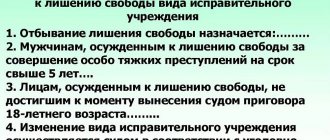ST 62 of the Criminal Code of the Russian Federation.
1. In the presence of mitigating circumstances provided for in paragraphs “and” and (or) “k” of part one of Article 61 of this Code, and in the absence of aggravating circumstances, the term or amount of punishment cannot exceed two-thirds of the maximum term or amount of the most severe type of punishment provided for by the relevant article of the Special Part of this Code.
2. In the case of concluding a pre-trial agreement on cooperation in the presence of mitigating circumstances provided for in paragraph “and” of part one of Article 61 of this Code, and in the absence of aggravating circumstances, the term or amount of punishment cannot exceed half the maximum term or amount of the most severe type of punishment provided for in the relevant article Special part of this Code.
3. The provisions of part one of this article do not apply if the corresponding article of the Special Part of this Code provides for life imprisonment or the death penalty. In this case, the punishment is imposed within the sanction of the relevant article of the Special Part of this Code.
4. In the event of concluding a pre-trial agreement on cooperation, if the relevant article of the Special Part of this Code provides for life imprisonment or the death penalty, these types of punishment are not applied. In this case, the term or amount of punishment cannot exceed two-thirds of the maximum term or amount of the most severe type of punishment in the form of imprisonment, provided for by the relevant article of the Special Part of this Code.
5. The term or amount of punishment imposed on a person in respect of whom a criminal case is considered in the manner prescribed by Chapter 40 of the Criminal Procedure Code of the Russian Federation cannot exceed two-thirds of the maximum term or amount of the most severe type of punishment provided for the crime committed, and in in the case specified in Article 226.9 of the Criminal Procedure Code of the Russian Federation - one-half of the maximum term or amount of the most severe type of punishment provided for the crime committed.
Commentary to Art. 62 Criminal Code
1. The commented article enshrines four rules on mandatory mitigation of punishment. The obligation in relation to the article in question (as well as to Articles 65, 66 of the Criminal Code) must be understood in such a way that, in the presence of the conditions enshrined in Art. 61 of the Criminal Code, the court must reduce the upper limit of the sanction in accordance with the requirements specified in the norm in question, and be guided by it when assigning punishment.
2. The first of the rules, formulated in Part 1 of Art. 62 of the Criminal Code, applies if there is at least one of the mitigating circumstances provided for in paragraphs “i” and “k” of Part 1 of Art. 61 CC; There are no aggravating circumstances listed in Art. 63 of the Criminal Code.
If the above conditions exist, the term or amount of punishment cannot exceed 2/3 of the maximum term or amount of the most severe type of punishment provided for in the relevant article of the Special Part of the Criminal Code. This rule applies only to the main punishment.
Rules Part 3 Art. 62 of the Criminal Code on the non-application of the provisions of Part 1 of Art. 62 of the Criminal Code do not apply to persons who, by force of law, are not sentenced to life imprisonment, including persons who have committed an unfinished crime. It should be borne in mind that Part 3 of Art. 62 of the Criminal Code does not contain a ban on the application of punishment in the form of life imprisonment in the presence of the conditions provided for in Part 1 of Art. 62 of the Criminal Code (clause 37 of the Resolution of the Plenum of the Supreme Court of the Russian Federation of December 22, 2015 No. 58).
3. The second of the rules, formulated in Part 2 of Art. 62 of the Criminal Code, applies if the person:
- confessed, actively contributed to the disclosure and investigation of the crime, the exposure and prosecution of other accomplices in the crime, the search for property obtained as a result of the crime (clause “i” of Part 1 of Article 61 of the Criminal Code);
— entered into a pre-trial cooperation agreement;
- his act does not contain the aggravating circumstances listed in Part 1 of Art. 63 of the Criminal Code.
The term or amount of punishment in this case cannot exceed 1/2 of the maximum term or amount of the most severe type of punishment provided for by the relevant article of the Special Part of the Criminal Code.
If the relevant article of the Special Part of the Criminal Code provides for life imprisonment or the death penalty, these types of punishment are not applied. In this case, the term or amount of punishment cannot exceed 2/3 of the maximum term or amount of the most severe type of punishment in the form of imprisonment, provided for by the relevant article of the Special Part of the Criminal Code. The rules for imposing punishment established by Part 4 of Art. 62 of the Criminal Code are also applied in the presence of aggravating circumstances.
A pre-trial cooperation agreement is concluded between the parties of the prosecution and defense, in which these parties agree on the terms of liability of the suspect or accused depending on his actions after the initiation of a criminal case or the filing of charges (Article 5 of the Code of Criminal Procedure of the Russian Federation). The suspect or accused indicates what actions he undertakes to perform in order to assist the investigation in solving and investigating the crime, exposing and prosecuting other accomplices in the crime, and searching for property obtained as a result of the crime.
4. The third of the rules, formulated in Part 5 of Art. 62, was enshrined in criminal law for the first time (although both now and previously it was provided for in Chapter 40 of the Code of Criminal Procedure of the Russian Federation) and is applied if the accused:
a) with the consent of the public or private prosecutor and the victim, declared his agreement with the accusation brought against him;
b) applied for a verdict without a trial (Chapter 40 of the Code of Criminal Procedure of the Russian Federation);
c) convicted of a crime for which the punishment under the Criminal Code does not exceed 10 years in prison.
In this case, if the judge comes to the conclusion that the accusation is justified and supported by evidence collected in the criminal case, he will pronounce a guilty verdict and impose a punishment on the defendant, which cannot exceed 2/3 of the maximum term or amount of the most severe type of punishment provided for the crime committed. .
5. In the event of a guilty verdict in a criminal case, the inquiry into which was carried out in an abbreviated form, the punishment assigned to the defendant cannot exceed 1/2 of the maximum term or the amount of the most severe type of punishment provided for the crime committed (Part 5 of Article 62 of the Criminal Code - fourth rule).
6. When establishing the circumstances provided for by both Part 5 and Part 1 of Art. 62 of the Criminal Code, a set of rules for mitigation of punishment is applied: first, the provisions of Part 5 of Art. 62 of the Criminal Code, then - Part 1 of Art. 62 of the Criminal Code. Thus, the maximum possible punishment in these cases should not exceed: 2/3 of 2/3 - when considering a criminal case in the manner provided for in Chapter. 40 of the Code of Criminal Procedure of the Russian Federation, and 2/3 from 1/2 - in the case specified in Art. 226.1 Code of Criminal Procedure of the Russian Federation.
Everything about criminal cases
Go to the Criminal Code
Url Additional information:
Appointed for a maximum of 2/3 of the term
— Part 1 62 of the Criminal Code
in the presence of a confession (
clause "and" part 1 61 of the Criminal Code
)
— Part 1 62 of the Criminal Code
in the presence of active assistance (
clause “and” part 1 61 of the Criminal Code
)
— Part 1 62 of the Criminal Code
when providing medical assistance to the victim (
clause "k" part 1 61 of the Criminal Code
)
— Part 1 62 of the Criminal Code
if the victim is compensated for damage (
clause "k" part 1 61 of the Criminal Code
)
— Part 1 62 of the Criminal Code
if the harm is made up to the victim (
clause "k" part 1 61 of the Criminal Code
)
— Part 4 62 Criminal Code
if a pre-trial agreement has been concluded
— Part 5 62 Criminal Code
if the case is considered in a special order
Maximum 1/2 term assigned
— Part 2 62 of the Criminal Code
if the pre-trial agreement and circumstances are from
paragraphs" and "part 1 of 61 CC
- part 5 of 62 CC
if the inquiry was carried out in an abbreviated form
Strict Rule for Death Penalty
— Part 3 62 Criminal Code
if the article provides for capital punishment, then
Part 1 62
ADDITIONAL INFORMATION
- paragraph 36
Plenum No. 58 features of the application of Article
62 of the Criminal Code
Strict rule
Hard Rule
norms of
Part 3 62 of the Criminal Code
for articles with life or death penalties
Two pluses
Two types of advantages
, cumulative effect (standards
part 1
and
part 5 62 Criminal Code
)
SITUATIONS from practice
Mitigating circumstances
several, but the court took into account only one thing, which was violated?
LOOKING FOR ERRORS (in VIP
-parts of the site)
Court error
— failure to take into account the second mitigating circumstance, how to find it
Article 62 of the Criminal Code. Imposition of punishment in the presence of mitigating circumstances
Url Additional information:
Plank
Punishment bar
, failure of the court to take into account restrictions when assigning punishment
1) If available:
Url Additional information:
Means softening:
— clause "i" part 1 61 of the Criminal Code
the accused turned himself in (
142 Code of Criminal Procedure
)
— clause "i" part 1 61 of the Criminal Code
actively contributed to the investigation
— clause "k" part 1 61 of the Criminal Code
medical assistance was provided to the victim
— clause "k" part 1 61 of the Criminal Code
compensation was made to the victim
— clause "k" part 1 61 of the Criminal Code
reparations have been made
Additional Information
- paragraph 36
Plenum No. 58, at least one mitigating circumstance is sufficient
RECEPTION protection
Full refund
moral damage to obtain the plus of
Part 1 62 of the Criminal Code
- mitigating circumstances provided for in paragraphs “and”, paragraph “k”, Part 1 of 61 of the Criminal Code,
- and the absence of aggravating circumstances;
Url Additional information:
Preparation
- paragraph 34
Plenum No. 58 2/3 when preparing is counted from
Part 2 66 of the Criminal Code
Assault
- paragraph 34
Plenum No. 58 2/3 in case of attempt is counted from
Part 3 66 of the Criminal Code,
the term or amount of punishment cannot exceed 2/3 of the maximum term or amount
Url Additional information:
- paragraph 33
Plenum No. 58, which is considered the most severe type of punishment
the most severe type of punishment provided for in the relevant article of the Criminal Code.
Url Additional information:
Punishment for pre-trial agreement
Punishment during pre-trial
agreement, modifier
part 2 62 of the Criminal Code
2) In the case of:
— concluding a pre-trial cooperation agreement,
- in the presence of mitigating circumstances provided for in paragraph 1 and 61 of the Criminal Code,
- and the absence of aggravating circumstances, the term or amount of punishment
Url Additional information:
- paragraph 24
Plenum No. 16, with agreement, the term is not 2/3 (
Part 1 62 of the Criminal Code
) - but 1/2 (
Part 2 of 62 Criminal Code
)
Preparation
- paragraph 34
Plenum No. 58 1/2 when preparing is counted from
Part 2 66 of the Criminal Code
Assault
- paragraph 34
Plenum No. 58 1/2 in case of attempt is counted from
Part 3 66 of the Criminal Code
cannot exceed 1/2 of the maximum term or amount of the most severe type of punishment provided for by the relevant article of the Criminal Code.
Url Additional information:
- paragraph 19
Plenum No. 1 Part 3 62 of the Criminal Code does not apply to minors
- paragraph 37
Plenum No. 58 who is not subject to the strict norm
of Part 3 62 of the Criminal Code
Hard rule
Hard Rule
norms of
Part 3 62 of the Criminal Code
for articles with life or death penalties
3) The provisions of Part 1 of this article do not apply if the relevant article of the Criminal Code provides for life imprisonment or the death penalty.
In this case, the punishment is imposed within the sanction of the relevant article of the Special Part of the Criminal Code.
Url Additional information:
-
P . 38
of the Plenum No. 58 rules
part 4 62 of the Criminal Code
are also applied in case of aggravating
4) In the case of concluding a pre-trial agreement on cooperation, if the relevant article of the Criminal Code provides for life imprisonment or the death penalty, these types of punishment are not applied.
Url Additional information:
Preparation
- paragraph 34
Plenum No. 58 2/3 when preparing, the period is counted from
Part 2 66 of the Criminal Code
Attempt
- paragraph 34
Plenum No. 58 2/3 for an attempt, the term is counted from
Part 3 of 66 of the Criminal Code
. In this case, the term or amount of punishment cannot exceed 2/3 of the maximum term or amount of the most severe type of punishment in the form of imprisonment provided for by the relevant article of the Criminal Code.
Url Additional information:
Special punishment
Punishment under special circumstances
order, modifier
part 5 62 of the Criminal Code
5) The term or amount of punishment imposed on the person
- a criminal case in respect of which was considered in the manner prescribed by Chapter 40
of the Criminal Procedure Code,
Url Additional information:
Preparation
- paragraph 34
Plenum No. 58 2/3 when preparing is counted from
Part 2 66 of the Criminal Code
Assault
- paragraph 34
Plenum No. 58 2/3 in case of assassination attempt is counted from
Part 3 66 of the Criminal Code
Two pluses
— clause 14
Plenum No. 60, the matter is in a special order, at the same time the advantages of
part 1
and
part 5 62
- paragraph 39
Plenum No. 58 if at the same time there are two types of advantages of norm 62 of the Criminal Code
Cumulative effect
Two types of advantages
, the cumulative effect of the norms of
Part 1
and
Part 5 of 62 of the Criminal Code
cannot exceed 2/3 of the maximum term or amount of the most severe type of punishment provided for the crime committed,
— and in the case specified in Article 226.9 of the Code of Criminal Procedure,
Url Additional information:
Preparation
- paragraph 34
Plenum No. 58 1/2 when preparing is counted from
Part 2 66 of the Criminal Code
Assault
- paragraph 34
Plenum No. 58 1/2 for an attempt is counted from
Part 3 66 of the Criminal Code
- cannot exceed 1/2 of the maximum term or amount of the most severe type of punishment provided for the crime committed.
Return to the Criminal Code
Seek advice
Second commentary to Art. 62 of the Criminal Code of the Russian Federation
1. The article provides for different types of accounting for mitigating circumstances. As a rule, accounting is carried out with a correction of the maximum terms (amounts) of punishment established by a specific article of the Special Part.
2. When the court establishes the surrender of a guilty person or active assistance in the disclosure or investigation of a crime, the exposure and criminal prosecution of other accomplices in a crime, the search for property obtained as a result of a crime (clause “i” of Part 1 of Article 61 of the Criminal Code), or the fact of rendering them medical and other assistance to the victim immediately after the commission of a crime, or voluntary compensation for property damage and moral harm caused as a result of the crime, or other actions aimed at making amends for the harm caused to the victim (clause “k” of Part 1 of Article 61 of the Criminal Code) , if no aggravating circumstances are identified in the case, the term or amount of the imposed punishment cannot exceed two-thirds of the maximum term or amount of the most severe type of punishment provided for by the relevant article of the Special Part of the Criminal Code.
3. If, along with the circumstances specified in Part 1 of Art. 62 of the Criminal Code, the court will establish the presence of other mitigating circumstances, the punishment must be imposed taking into account all mitigating circumstances (clause 36 of the PPVS 2015).
4. In case of a pre-trial agreement on cooperation, in the presence of circumstances provided for in paragraph “i” of Part 1 of Art. 61 of the Criminal Code, the term or amount of the imposed punishment cannot exceed half the maximum term or amount of the most severe type of punishment provided for the crime committed. If these circumstances are not established, then the term or amount of punishment cannot exceed two-thirds of the maximum term or amount of the most severe type of punishment in the form of imprisonment, provided for by the relevant article of the Special Part of the Criminal Code. But these provisions apply if the person has fulfilled the terms of the pre-trial cooperation agreement (Article 63.1 of the Criminal Code) (Clause 38 of the PPVS 2015).
5. Rules for imposing punishment established by Part 4 of Art. 62 of the Criminal Code are also applied in the presence of circumstances aggravating the punishment (clause 38 of the PPVS 2015).
6. Two-thirds of the maximum term or amount of the most severe type of punishment provided for the crime committed is the limit for the punishment imposed on the person in respect of whom the criminal case was considered in the manner prescribed by Chapter. 40 Code of Criminal Procedure. In the case specified in Art. 226.9 of the Code of Criminal Procedure, the limit is one-half of the maximum term or amount of the most severe type of punishment provided for the crime committed.
7. When establishing the circumstances provided for by both Part 5 and Part 1 of Art. 62 of the Criminal Code, a set of rules for mitigation of punishment is applied: first, the provisions of Part 5 of Art. 62 of the Criminal Code, then - Part 1 of Art. 62 of the Criminal Code. Thus, the maximum possible punishment in these cases should not exceed: two thirds of two thirds - when considering a criminal case in the manner provided for in Chapter. 40 of the Code of Criminal Procedure, and two-thirds of one-half - in the case specified in Art. 226.9 Code of Criminal Procedure (clause 39 PPVS 2015).






